|
|
|
Sort Order |
|
|
|
Items / Page
|
|
|
|
|
|
|
| Srl | Item |
| 1 |
ID:
142708
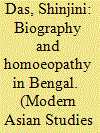

|
|
|
|
|
| Summary/Abstract |
Despite being recognized as a significant literary mode in understanding the advent of the modern self, biographies as a genre have received relatively little attention from South Asian historians. Likewise, histories of science and healing in British India have largely ignored the colonial trajectories of those sectarian, dissenting, supposedly pseudo-sciences and medical heterodoxies that have flourished in Europe since the late eighteenth century. This article addresses these gaps in the historiography to identify biographies as a principal mode through which an incipient, ‘heterodox’ Western science like homoeopathy could consolidate and sustain itself in Bengal. In recovering the cultural history of a category that the state archives render largely invisible, this article argues that biographies are more than a mere repository of individual lives, and in fact are a veritable site of power. In bringing histories of print and publishing, histories of medicine, and histories of life writing practices together, it pursues two broad themes: first, it analyses the sociocultural strategies and networks by which scientific doctrines and concepts are translated across cultural borders. It explores the relation between medical commerce, print capital, and therapeutic knowledge to illustrate that acculturation of medical science necessarily drew upon and reinforced local constellations of class, kinship, and religion. Second, it simultaneously reflects upon the expanding genre of homoeopathic biographies published since the mid-nineteenth century: on their features, relevance, and functions, examining in particular the contemporary status of biography vis-à-vis ‘history’ in writing objective pasts.
|
|
|
|
|
|
|
|
|
|
|
|
|
|
|
|
| 2 |
ID:
142716
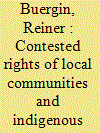

|
|
|
|
|
| Summary/Abstract |
The conceptualization of interrelations between biological and cultural diversity since the 1980s indicates a biocultural turn in discourses and policies regarding nature conservation, sustainable development, and indigenous peoples. These interrelations frequently manifest as conflicts between local communities who derive their livelihoods and identity from their lands and resources, and external actors and institutions who claim control over these areas, invoking superior interests in nature conservation, development, and modernization. In these asymmetric conflicts over biocultural diversity, framed in discourses that demand the preservation of both biological and cultural diversity, the opportunities for local communities to assert their claims crucially depend on external discursive and legal frameworks.
|
|
|
|
|
|
|
|
|
|
|
|
|
|
|
|
| 3 |
ID:
142714


|
|
|
|
|
| Summary/Abstract |
Trần Hưng Đạo (1228–1300), the Vietnamese general who led troops to hold off Mongol invasions in the thirteenth century, is honoured across Vietnam today as a hero of the nation (anh hùng dân tộc). This ubiquitous representation has, however, come about only recently, having been crafted in the twentieth century. Prior to that time, Trần Hưng Đạo was honoured in other ways. This article will examine precisely how it is that Trần Hưng Đạo was represented and remembered in various works—from official histories to spirit writing texts—between the fifteenth and twentieth centuries. It will trace the transformations in these representations over time and argue that it was only in the early twentieth century that Trần Hưng Đạo began to be represented as a national hero. In its coverage of the transformations in Trần Hưng Đạo's representation, this article will demonstrate how modern nationalist ideas emerged in Vietnam in the early twentieth century.
|
|
|
|
|
|
|
|
|
|
|
|
|
|
|
|
| 4 |
ID:
142709


|
|
|
|
|
| Summary/Abstract |
This paper examines the case of a Shiite practitioner of Tibetan medicine in Ladakh, North-western India. It recounts the story of a Buddhist family converted to Islam, for which the abandonment of religion has not led to the discontinuation of a lineal medical practice known to have Buddhist overtones. This situation provides an invitation to explore the social consequences of maintaining the practice in a region characterized by religious conflict, as well as the criteria of sameness and difference, technique and genealogy that make a marked ‘other’ a practitioner of Tibetan medicine. These religious overlaps are, however, not only apparent at the social level; they are also present in the preparation of medicines, in etiological narratives or in the physical regimes of bodily care. The composite nature of medical practice helps us to observe from a new angle the role of religion in the practice of Tibetan medicine. The way medicine is enacted and performed in this context provides empirical materials to study the paradigms that both structure and confer motion to Tibetan learned medicine. The ethnography of a remote region in the Himalayas opens up research paths for the anthropology of Asian medicine amongst new categories of healers and renewed contexts of practice.
|
|
|
|
|
|
|
|
|
|
|
|
|
|
|
|
| 5 |
ID:
142706
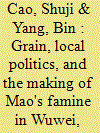

|
|
|
|
|
| Summary/Abstract |
Mao's Great Famine in Wuwei County, Anhui Province, between the years of 1958 and 1960, resulted in the deaths of about 245,000 people, a quarter of the local population. By focusing on grain production and consumption, this article adopts a local perspective to examine the county's official archives and analyse the background, rationale, and processes of local authorities that led to one of the highest death rates in the country. A local perspective provides an empirical microanalysis of the Great Famine; illustrates the complexity of this catastrophe; argues for local factors such as factional struggles, central-local interactions, and the political atmosphere created by the series of pre-1958 campaigns as key to local variations of the disaster; and delivers national implications for viewing Mao's China. Official archives explored in this article reveal that an over-reporting of grain output might have resulted in the Great Famine, but did not necessarily lead to the massive death toll, and that local politics, particularly intra-party factional struggles, intertwined with central-local political interactions, were crucial for the terrible tragedy that ensued in Wuwei, and that the end of this famine resulted not from peasants’ resistance, nor the change of radical polices to moderate ones, but from the decreased demand for grain caused by the massive number of deaths.
|
|
|
|
|
|
|
|
|
|
|
|
|
|
|
|
| 6 |
ID:
142707


|
|
|
|
|
| Summary/Abstract |
This article examines the cosmopolitan world of the colonial zenana through the marriages of two mid-twentieth-century royal Indian women, Maharani Brijraj Kumari of Dhrangadhra and Maharani Krishna Kumari of Jodhpur. In particular, it analyses the close connection between zenana women's education and emergent adolescent sexuality. These women ordinarily began their studies in mixed-gender classrooms with their brothers and male cousins as children. As they neared the age of menarche, girls were extracted from the formal schoolroom and undertook instruction in household management and childcare in preparation for their expected roles as wives and mothers. Despite being prematurely cut off from the childhood classroom, women's educational backgrounds (in both Western and Indic forms of knowledge) and future learning potential remained an important part of their postmarital identity. Young, anglicized Indian men increasingly desired wives who reflected the modernity that they hoped to represent as imperial subjects and were encouraged to adopt by British advisors and tutors. They required wives who would not wear pardah and thus reflect more Western ideals of companionate marriages of friendship, yet simultaneously live in gender-segregated palace quarters, uphold traditional kinship networks, perform religious duties, and engage in the maintenance of a large polygamous household. Definitions of sex, marriage, and domesticity were increasingly cross-cultural and pan-historical in nature, incorporating aspects both of the ‘modern’ and the ‘traditional’, the Indic and the European, the regional and the transnational.
|
|
|
|
|
|
|
|
|
|
|
|
|
|
|
|
| 7 |
ID:
142710


|
|
|
|
|
| Summary/Abstract |
This article explores how nutrition science became a significant part of the nation-building project in both Republican China and the early People's Republic of China within the context of burgeoning popular concerns over bodily health and an increasing sense of urgency. Insofar as nutrition science offered a new type of expertise about what to eat and what not to eat in daily life, it entailed harnessing the state's potential persuasive power to garner willing compliance, if not tacit obedience, from the population. Unlike previous scholarship, which takes the viewpoint of government authorities and the medical elite, this article argues that popular concerns about bodily health and culinary curiosity that were prevalent in major Chinese cities helped to popularize state-led dietary reform campaigns that culminated during the Sino-Japanese War (1937–1945) and continued even after the revolutionary regime change in the 1950s.
|
|
|
|
|
|
|
|
|
|
|
|
|
|
|
|
| 8 |
ID:
142712
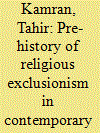

|
|
|
|
|
| Summary/Abstract |
During the late nineteenth-century colonial era in India, the Khatam-e-Nubuwwat (Finality of the Prophethood) assumed remarkable salience as a theme for religious debate among Muslim sects. The controversies around the establishment of the Ahmadiya sect in 1889 brought the issue of Khatam-e-Nubuwwat to the centre stage of religious polemic or munazara. Tense relations continued between Ahmadiya and Sunnis, in particular, though the tension remained confined to the domain of religious polemic. However, immediately after Pakistan's creation, the Khatam-e-Nubuwwat squeezed itself out of the epistemic confines of the ‘theological’ and entered the realm of the ‘political’. Majlis-Tahafuz-i-Khatam-e-Nubuwwat (the Association for the Safety of the Finality of the Prophethood) grew out of the almost-defunct Majlis-i-Ahrar-i-Islam on 13 January 1949, with the principal objective of excluding the Ahmadiya sect from the Islamic fold.1 This article seeks to reveal how the Khatam-e-Nubuwwat has impinged upon the course of Pakistani politics from 1949 onwards as an instrument of religious exclusion, peaking in 1953. The pre-history of religious exclusion, which had 1889 as a watershed—the year when the Ahmadiya sect took a definitive shape—thus forms the initial part of the article.
|
|
|
|
|
|
|
|
|
|
|
|
|
|
|
|
| 9 |
ID:
142713
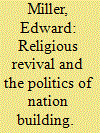

|
|
|
|
|
| Summary/Abstract |
Scholars have portrayed the 1963 ‘Buddhist crisis’ in South Vietnam as a struggle for religious freedom, as a political conspiracy, or as a manifestation of ancient religious beliefs and practices. This paper, in contrast, argues that the crisis emerged from a clash of modernizing visions. The Buddhist-led protests that took place in South Vietnam in 1963 were linked to the Vietnamese Buddhist revival, a nationalist reform movement that began during the early twentieth century. The protests also reflected growing Buddhist anxieties about the Ngo Dinh Diem government's nation-building agenda for South Vietnam. By the time the crisis began, Buddhist leaders had concluded that this agenda (which Diem referred to as the ‘Personalist Revolution’) was incompatible with their plans to realize Vietnam's destiny as a ‘Buddhist nation’. In addition to reinterpreting the origins of the crisis, this paper examines how the course of events was shaped by the personalities and agendas of particular Buddhist and government leaders, and especially by fierce rivalries among members of Diem's family. These internal tensions help to explain the failure of attempts to end the crisis through negotiations, as well as Diem's decision to crush the movement by force in August 1963.
|
|
|
|
|
|
|
|
|
|
|
|
|
|
|
|
| 10 |
ID:
142715
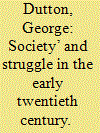

|
|
|
|
|
| Summary/Abstract |
At the beginning of the twentieth century, the Vietnamese were confronted with the harsh realities of French colonialism, while simultaneously engaging with a flood of new concepts and the language that came with them. Among these concepts was that of ‘society’, whose import was enhanced by its linkages with the discourse of social Darwinism. This article explores the Vietnamese neologistic project of the early twentieth century through a close examination of the ways in which the concept and labels for ‘society’ were brought in and understood. I argue that the arrival of ‘society’ in conjunction with social Darwinism profoundly shaped the Vietnamese understanding of the term, implicating it in a notion of struggle and contestation. By illustrating the introduction of ‘society’ through early modernist school textbooks I suggest the ways in which Vietnamese conceptualized it as they embarked on their own struggle with the threats posed by colonialism.
|
|
|
|
|
|
|
|
|
|
|
|
|
|
|
|
| 11 |
ID:
142711


|
|
|
|
|
| Summary/Abstract |
In Laos—one of the few remaining ‘officially’ socialist countries—Buddhism was abolished as a state religion after the revolution in 1975. However, since the 1990s the communist government has been increasingly using its patronage of Buddhism to gain legitimacy. With reference to the divine sources of power in Theravāda Buddhism, this article explores the extent to which modern Lao state socialism is still imbued with pre-revolutionary patterns of Buddhist kingship and statecraft. The analysis will focus especially on ritual patronage of a Buddhist relic shrine and on the recent inauguration of statues of deceased kings in the Lao capital, Vientiane. With reference to the ritual animation of ‘opening the eyes’ of the statues, and with regard to theories exploring the agency of objects, I argue that the Lao palladium has to be understood as being made up of ‘living’ entities. Finally, the article explores to what extent the control, worship, and creation of statues and relics today are still essential for the legitimacy of rule in the Lao People's Democratic Republic.
|
|
|
|
|
|
|
|
|
|
|
|
|
|
|
|
|
|
|
|
|